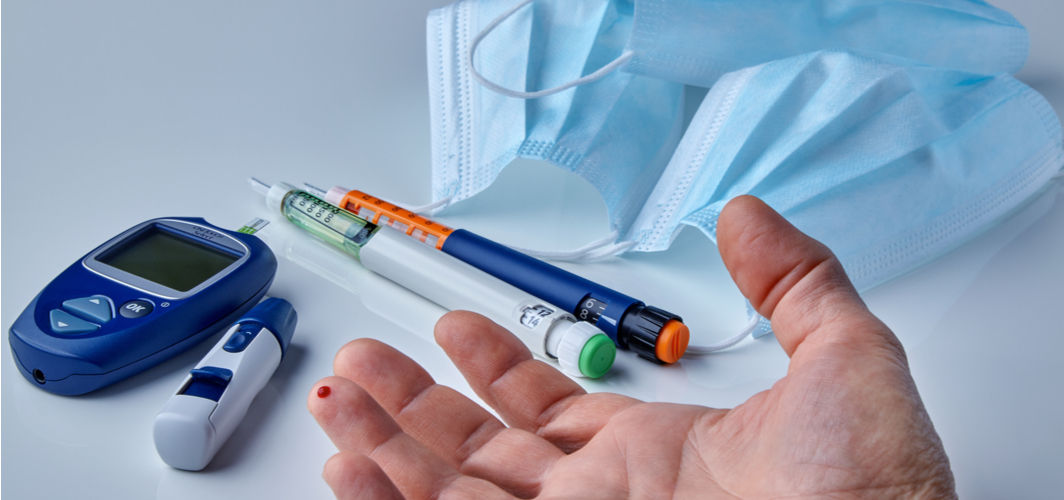Diabetes Management
Diabetes and Dry Eyes: Is there a Connection?
2 min read
Published on - 09 November 2023
Share this article
0
0 like

Tears play a vital role in maintaining eye health by keeping the eyes lubricated, nourished, and free from irritants. However, when the balance of tear production and drainage is disrupted, it can lead to symptoms like dry eyes. Let’s dive deeper to understand which eye complications can be caused due to diabetes; if there is a connection between diabetes and dry eyes, and more.
Diabetes and Eye Complications
Diabetes is a chronic condition that affects blood sugar levels. If not controlled properly, it can lead to a range of complications, including those impacting your eyes. Diabetic retinopathy, glaucoma, and cataracts are well-known diabetic eye conditions. These eye issues can cause symptoms such as blurry vision, difficulty focusing, and visual disturbances. One of the common eye complications of type 1 & type 2 diabetes also includes dry eyes.
Diabetes and Dry Eye Syndrome
Dry eye syndrome occurs when the eyes do not produce enough quality tears to keep the eyes adequately lubricated. Diabetes can lead to this condition due to various factors. High blood sugar levels can affect the nerves that regulate tear production and the blood vessels that nourish the eyes. Furthermore, diabetes-related inflammation can contribute to eye discomfort. Dry eye symptoms may include stinging, burning, redness, and a sensation of having a foreign object in the eye.
When to Seek Medical Advice
If you have diabetes and you are experiencing dry eyes, it's essential to consult with an eye care professional. They can assess your symptoms, perform necessary tests, and determine the underlying cause. Managing diabetes effectively through blood sugar control and adopting a healthy lifestyle can help prevent or alleviate diabetic eye conditions.
Conclusion:
Diabetes can bring about various eye conditions, including the well-known diabetic retinopathy, glaucoma, and cataracts. It can also cause dry eye syndrome which is caused primarily due to high blood sugar. This condition, characterised by insufficient and poor-quality tear production, can lead to discomfort, redness, and irritation in the eyes.
Diabetes Management
Consult Top Diabetologists
View AllLeave Comment
Recommended for you

Diabetes Management
COVID-19 and Diabetes management: Clinical guidelines
Recently, the Ministry of Health and Family Welfare (MoHFW) has revised the guidelines on the diagnosis and management of diabetes among COVID-19 patients at patient management facilities.

Diabetes Management
A Healthy Weight is Key to Better Blood Sugar Control
Maintaining a healthy weight is crucial for better blood sugar control. Excess weight can contribute to insulin resistance and difficulty managing blood sugar levels. By adopting a balanced diet, engaging in regular physical activity, and maintaining a healthy weight, individuals can improve insulin sensitivity and enhance their ability to manage blood sugar effectively.

Diabetes Management
Can Diabetics Eat Bananas?
Diabetics can eat bananas but in moderation. Bananas are a good source of fibre, potassium, and vitamins. However, bananas also contain natural sugars, so portion control is important. It's recommended to choose ripe bananas with a lower glycemic index and include them as part of a balanced meal or snack.
Subscribe
Sign up for our free Health Library Daily Newsletter
Get doctor-approved health tips, news, and more.
Visual Stories

8 Fruits That are Incredibly Healthy for Diabetes
Tap to continue exploring
Recommended for you

Diabetes Management
COVID-19 and Diabetes management: Clinical guidelines
Recently, the Ministry of Health and Family Welfare (MoHFW) has revised the guidelines on the diagnosis and management of diabetes among COVID-19 patients at patient management facilities.

Diabetes Management
A Healthy Weight is Key to Better Blood Sugar Control
Maintaining a healthy weight is crucial for better blood sugar control. Excess weight can contribute to insulin resistance and difficulty managing blood sugar levels. By adopting a balanced diet, engaging in regular physical activity, and maintaining a healthy weight, individuals can improve insulin sensitivity and enhance their ability to manage blood sugar effectively.

Diabetes Management
Can Diabetics Eat Bananas?
Diabetics can eat bananas but in moderation. Bananas are a good source of fibre, potassium, and vitamins. However, bananas also contain natural sugars, so portion control is important. It's recommended to choose ripe bananas with a lower glycemic index and include them as part of a balanced meal or snack.
